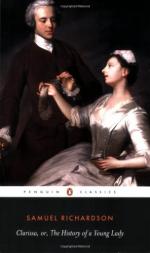I wish, from my heart, thou wert a money-lover! Were the estate to be of double the value, thou shouldst have it every shilling; only upon one condition [for my circumstances before were as easy as I wish them to be while I am single]—that thou wouldst permit me the honour of being this fatherless lady’s father, as it is called, at the altar.
Think of this! my dear Lovelace! be honest: and let me present thee with the brightest jewel that man ever possessed; and then, body and soul, wilt thou bind to thee for ever thy
Belford.
LETTER XIV
Mr. Lovelace, to John Belford,
ESQ.
Thursday, June 15.
Let me alone, you great dog, you!—let me alone!—have I heard a lesser boy, his coward arms held over his head and face, say to a bigger, who was pommeling him, for having run away with his apple, his orange, or his ginger-bread.
So say I to thee, on occasion of thy severity to thy poor friend, who, as thou ownest, has furnished thee (ungenerous as thou art!) with the weapons thou brandishest so fearfully against him.—And to what purpose, when the mischief is done? when, of consequence, the affair is irretrievable? and when a Clarissa could not move me?
Well, but, after all, I must own, that there is something very singular in this lady’s case: and, at times, I cannot help regretting that ever I attempted her; since not one power either of body or soul could be moved in my favour; and since, to use the expression of the philosopher, on a much graver occasion, there is no difference to be found between the skull of King Philip and that of another man.
But people’s extravagant notions of things alter not facts, Belford: and, when all’s done, Miss Clarissa Harlowe has but run the fate of a thousand others of her sex—only that they did not set such a romantic value upon what they call their honour; that’s all.
And yet I will allow thee this—that if a person sets a high value upon any thing, be it ever such a trifle in itself, or in the eye of others, the robbing of that person of it is not a trifle to him. Take the matter in this light, I own I have done wrong, great wrong, to this admirable creature.
But have I not known twenty and twenty of the sex, who have seemed to carry their notions of virtue high; yet, when brought to the test, have abated of their severity? And how should we be convinced that any of them are proof till they are tried?
A thousand times have I said, that I never yet met with such a woman as this. If I had, I hardly ever should have attempted Miss Clarissa Harlowe. Hitherto she is all angel: and was not that the point which at setting out I proposed to try?* And was not cohabitation ever my darling view? And am I not now, at last, in the high road to it?—It is true, that I have nothing to boast of as to her




